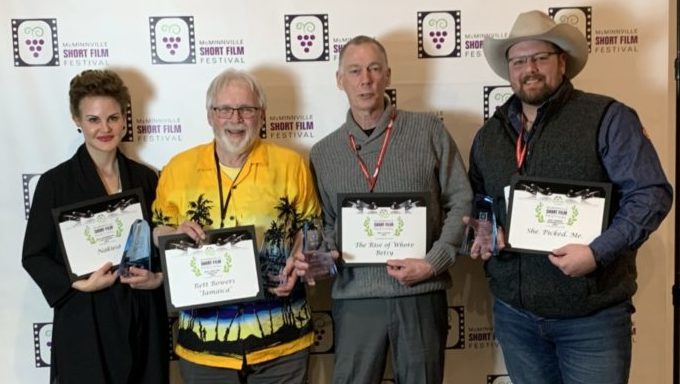McMinnville’s Cinema 10 this month offered a fascinating study in contrasts — a teachable moment, of sorts, with regard to the film industry.
One auditorium featured the latest comic book film on which multiplexes now, apparently, depend for their financial survival. Spider-Man: No Way Home has grossed nearly $761 million to date. This latest entry in the Marvel Cinematic Universe reportedly cost $200 million to make and was directed by Jon Watts, a 40-year-old from a city not much bigger than McMinnville. Before working on Hollywood blockbusters, he spent nearly a decade making short films, including a couple that did well at film festivals: Clay Pride and The Invisible Dog. You probably haven’t heard of them, but a couple of decades ago, those films signaled to a few select audiences that Watts was a filmmaker with a future.
Had you stepped out of Spider-Man, hung a left, and wandered into the largest auditorium, you would have found more than 100 films you hadn’t heard of, directed by people you don’t know, being screened for the 11th annual McMinnville Short Film Festival. Before they get a chance to go big, virtually all filmmakers start small, and festivals like McMinnville’s are where you go to see the Clay Prides and Invisible Dogs.
For an ostensibly “small-town” festival, this year’s McMinnville event had an epic vibe. It marked the event’s return to in-person after joining about 70 other festivals around the state in going virtual in 2021. It went four days, Feb. 10-13, packing about 100 minutes of films into nearly a dozen screening blocks. Directors had their pick of socials to attend, and by Sunday evening’s awards ceremony and dinner, masks were mostly off, local wines flowed freely, and there was a sneak peek at things to come. The festival is in the process of becoming an Oscar-qualifying festival, which would give winners a clearer shot at literally going for the gold.
The festival doesn’t release audience or submission numbers, but it’s hard to see the weekend as anything other than a win, even if the audiences were thinner than usual, although the one I hit Saturday afternoon had a couple of dozen watching. “It’s been a great festival,” Portland filmmaker and keynote speaker Kelley Baker told the awards dinner audience at The Bindery, after having warmed some of them up with a lively workshop the day before. “It was my first time here and it will not be my last. You’ll have to get a restraining order to get me to stop coming.”
And the winners are…
Grand Jury Award: Feeling Through, directed by Doug Roland.
Best Drama: Les Tissus Blancs, directed by Moly Kane.
Best Comedy: Sprötch, directed by Xavier Seron.
Best Suspense/Horror/Sci-Fi: She. Picked. Me., directed by Jason Wilkinson.
Best Experimental/A Bit Strange: Nakusa, directed by Jennifer Kramer.
Will Vinton Award for Best Animated Film: Mila, directed by Cinzia Angelini.
Best Documentary: Rat Tail, directed by Chad Sogas.
Best Environmental Award: Willow and Claude, directed by Emma Hakansson.
Shawash Ilihi Award for Best Native American Film: The People’s Newspaper, directed by Eléonore (Léo) Hamelin.
Best Oregon Filmmaker Award: Camp Yoshi, directed by Faith E. Briggs.
Best First-time Filmmaker Award: Jamaica, directed by Rett Bowers.
Best College Student Film: Creation in the Mourning, directed by Carly Sweet and Scott Gaede.
Sponsor

The festival honored 13 films this year, and the winners are a diverse bunch. Three films were from abroad: Les Tissus Blancs from France, Sprötch from Belgium, and Willow & Claude from Australia. A fourth, Mila, was directed by an Italian animator who lives in Los Angeles, while The People’s Newspaper was shot entirely in the Navajo Nation, mostly in Arizona.
Roughly half the winning films were directed (and sometimes written by) women, and about the same number were about women. In terms of swimming against the tide of American screens dominated by men, King’s The Rise of Whore Betsy functions as an anti-Western Western, with two women (Jennifer Sklias-Gahan and Sally-Anne Hunt) as the only on-screen characters and the violence (against women) only alluded to, but not shown. In Mila, the title character is a girl facing the horror of a World War II bombing run in an Italian village. Les Tissus Blancs is a devastating look at a young African woman (Awa Ba) whose family expects her to “restore” her virginity by having the controversial surgical procedure known as a hymenoplasty before she can marry. In Nakusa, Los Angeles director-writer Jennifer Kramer plays the title character in a surreal deep dive into the psychic landscape of trauma. It’s an astonishing performance that finds a nice balance of raw physicality (leg braces are part of her costume), subtlety, and mystery.

Trauma of various kinds and degrees, in fact, emerged as a theme this year in virtually every category. The oft-quoted observation that everyone is fighting a battle you know nothing about (frequently attributed to Robin Williams but which can be traced back to a Scottish minister in the late 1800s) seems like a good takeaway for a lot of this year’s films.
Chad Sogas’ autobiographical Rat Tail, for example, which was nominated in the documentary category, takes flight as a joyous compilation of family home videos centering on the fact that for 10 years as a youth, the filmmaker kept a thin strand of braided hair down his neck. The film then pulls back the curtain to reveal that for all that time, he was struggling with deep depression.
The Black Stonefly, directed by Cody Lewis and Marc Rotse, is about a former gang member from Tacoma who finds a new life and peace in fly fishing. That dovetailed nicely with If I Tell Them, in which a fishing guide struggles with the question of whether he should tell his clients that he is bipolar. In one drama block, one of the festival’s shortest films this year, Five Minutes, focuses on a woman whose abuser gives her exactly that much time to go buy cigarettes, which she uses to find someone, anyone, who will let her borrow a phone.
Given that last year’s festival was, like nearly all of Oregon’s film festivals, virtual, the McMinnville festival this year mercifully brought back some of last year’s highlights. One in particular, Tutu Grande (once again, trauma) by Bend filmmaker Derek Sitter (who spent the weekend in McMinnville) was perhaps the best illustration of why one really needs to see these films in a theater. Sure, it looked amazing, but the sound was, for all intents and purposes, new. Taylor Morden’s brilliant sound design that rumbles softly in the background while Sitter’s character interrogates Nathan Woodworth’s about raping his daughter is virtually missing in action at laptop or TV level.
Faced with more than 100 films each festival, it’s always agonizing to select a reasonable number to highlight here, but certainly three documentaries are worth mentioning. Águiles, which was up for the Grand Jury Award, follows the volunteers who go every weekend into Arizona’s desert to search for the remains of immigrants who didn’t make it. Hamelin’s The People’s Newspaper is a thoughtful account of the spread-too-thin staff of the Navajo Nation newspaper as they go about their jobs, already complicated by the sheer expanse of territory they cover, in the world of COVID.

The winning film in the environmental category, Willow and Claude, meanwhile, is a powerful, unsettling look at Australia’s wool industry, the cost of which is literally millions of slaughtered lambs annually. Hakansson, the director, was a fashion model who started asking where her clothes came from and was stunned when she found out. After a difficult-to-watch beginning, the film, a group effort by Collective Fashion Justice, steers into more optimistic territory, looking at plant-based alternatives to a truly horrific industry.
The filmmakers’ festival
Keynote speaker Baker, who has been in the trenches with Gus Van Sant and bills himself as the “Angry Filmmaker,” is animated but soft-spoken when you talk to him, and given that he’s been making films for 40 years, he can talk about pretty much any aspect of the industry. Before the festival this year, I chatted with him by phone and asked why these strange events called film festivals — an industry conference, basically, that is open to the public — are important.
“Independent filmmaking is alive and well,” Baker said. “It’s independent distribution that’s gone and has been gone for a long time. Even with the internet, more and more doors are being closed to filmmakers.”
When I pointed out that the internet gave filmmakers a DIY distribution platform they hadn’t previously enjoyed, he sounded more sad than angry.
“You don’t make any money,” he replied. “Filmmakers are in the same boat that musicians and so many other artists are. Everybody wants to watch your stuff, but nobody wants to pay you for it, so how do you make a living? I mean, that’s why I was on the road for so many years, showing my films all over the country at media art centers and art-house theaters.”
“Film festivals, especially short film festivals, which I truly love, offer ways for filmmakers to get their work out,” he continued. “Short films, people always say, will never make money, and short film festivals are a way to develop your audience and to meet other people doing the same thing you’re doing. There’s a lot of camaraderie that happens at the good festivals.”

Camaraderie was on full display throughout the weekend, with filmmakers sidling up to one another between screenings to introduce themselves. One of those who took full advantage of the “festival for filmmakers” was 23-year-old Ricky King, a Portland resident who got her BFA in broadcast journalism from Chapman University.
Her film, A Place to Grow, which screened in the student category and was her documentary thesis, depicts the friendship between two women working together on a community farm in Southern California.
“I met so many creative people and it was encouraging to see that a ton of them were from around here,” King said. “It was nice how much time was given within the festival to be able to actually meet each other instead of a quick hello and goodbye. It’s only been a week and it’s already made a difference.”
Back to the future
Given that this was the festival’s first in-person event since 2020 when it skirted COVID by just a few weeks, No. 11 was bound to be poignant. But it became all the more so at the awards dinner, when it was announced that Dan and Nancy Morrow will step down from the full-time grind and pass the torch to a new executive director. Heather Older, a filmmaker whose first McMinnville festival experience was a few years ago and who has been an active volunteer ever since, steps into the top spot. She will work with the Academy of Motion Picture Arts & Sciences to have the festival designated one where, like the BendFilm Festival, winners can be considered for an Oscar nomination.

“My feeling is we can apply this spring, but whether they accept our 2023 festival or not is another story,” said Nancy Morrow. “It may be that we have more work to do and would be looking at 2024. But we are going to apply, and my understanding is that the Academy helps you. They will tell you what you need to work on so you can improve and apply again.”
That would be a quantum leap from Year One, when the first McMinnville festival was held in a gym and featured a couple of dozen films from mostly Yamhill County, some of which were shot on cellphones and had to have the image flipped from vertical to horizontal. Dan Morrow likened the decision to “raising a child to 18 and sending them off to college.”
Older was humbled by the hand-off. “There’s absolutely no way that I can replace Nancy or Dan, or the combination of them with everything that they’ve created over the last 11 years that’s made this such an amazing festival,” she told the audience.
“I understand what it’s like to be a filmmaker and to be so vulnerable and to put your voice out there and to be seen and to be recognized, and the spirit of this film festival is to identify emerging filmmakers and new voices and showcase artists and be creative and mingle and do all these things,” she said. “These things will all carry forward.”

David Bates is an award-winning Oregon journalist with more than 20 years as a newspaper editor and reporter in the Willamette Valley, covering virtually every topic imaginable and with a strong background in arts/culture journalism. He has lived in Yamhill County since 1996 and is currently a freelance writer whose clients have included the McMinnville News-Register, Oregon Wine Press, and Indulge, a food-oriented publication. He has a B.S. degree in journalism from the University of Oregon and a long history of involvement in the theater arts, acting and on occasion directing for Gallery Players of Oregon and other theaters in Oregon.
Credit: Source link































